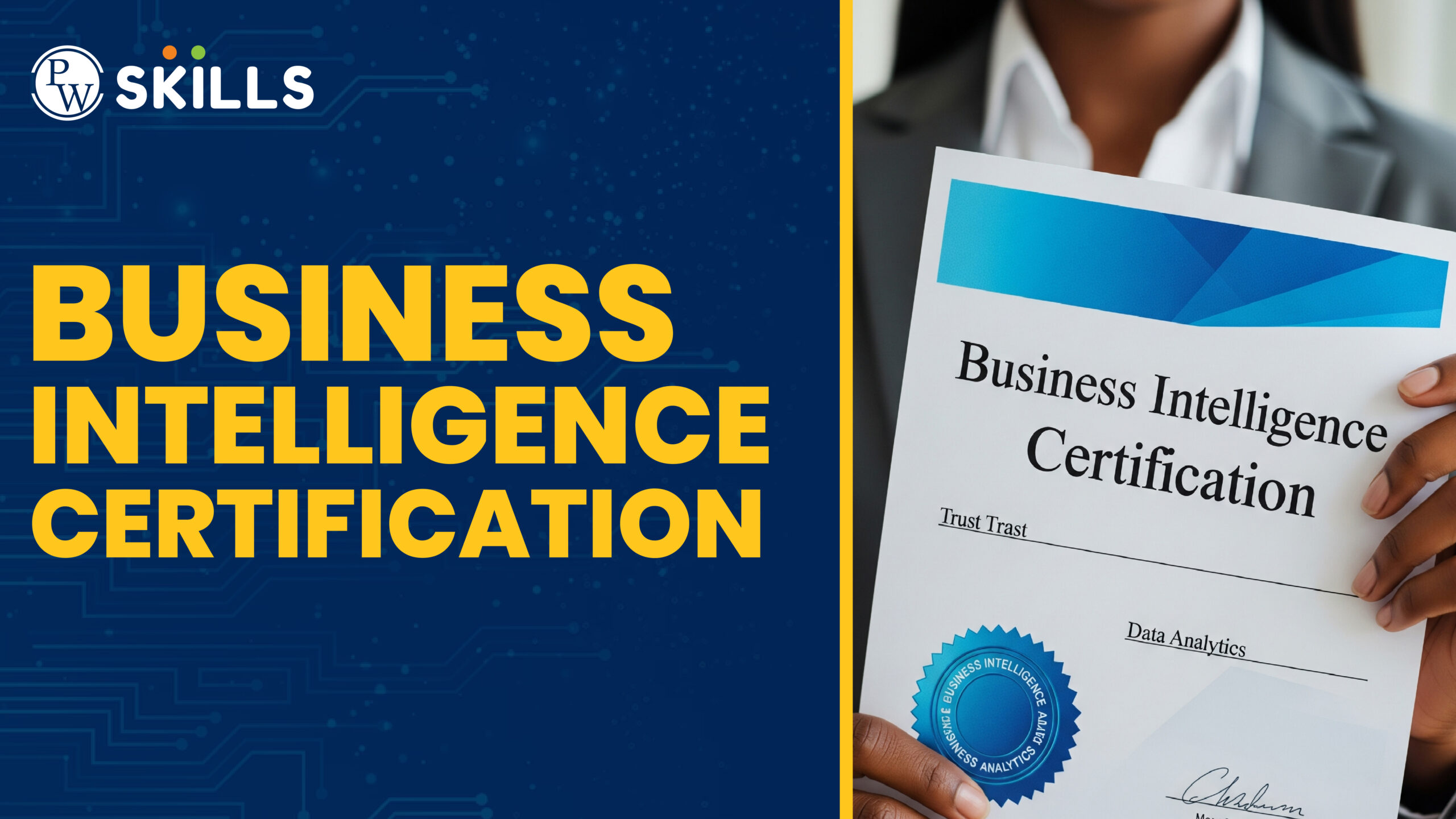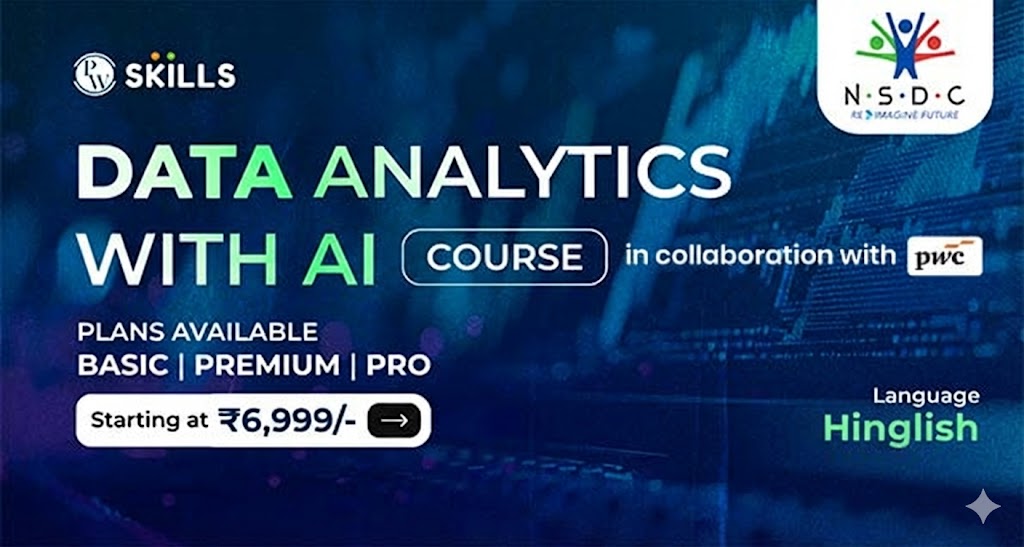In this age of digitization, data are often termed new oil. For every swipe or click or purchase or post, a piece of information has been generated that may be utilized by an organization to make smart decisions. But the data alone is not enough. Hence comes business intelligence (BI) — turning raw data into relevant insights. With industries now on the path of data-driven strategies, the demand for highly skilled professionals who speak the language of BI is at an all-time high. Business Intelligence Certification opens doors to exciting and impactful opportunities. Whether a student planning to go into a future-proof career or a working professional seeking to upskill, having a Business Intelligence Certification can give a remarkable turbo boost to anyone’s trajectory.
1. What is Business Intelligence Certification and Why Is It Important?
Business ntelligence Certification is a credential proving your expertise in analyzing data, using BI tools, and transforming complex datasets into business-friendly narratives. This certification instills skills in data visualization, reporting, dashboard design, and decision-making support. As businesses strive to stay ahead of the competition, they seek professionals who can employ tools such as Power BI, Tableau, or Looker to transform data into strategies. To an employer, the Business Intelligence Certification signals not only that you are trained but that you can truly make a viable impact from day one. This gives weight to your credibility in jobs associated with business strategy, analytics, or product performance.
2. Career Options after Business Intelligence Certification
With a Business Intelligence Certification, you could enter numerous career lines: Business Intelligence Analyst, Data Analyst, BI Developer, or some kind of Data Consultant. The Business Intelligence Analyst is one of the most popular, busy, and lucrative job profiles relating to the interpretation of data, development of visual reports, and assisting leadership in informed decision-making. Organizations are increasingly looking for certified BI resources across sectors, including finance, healthcare, retail, manufacturing, and tech. Many certified professionals also start to develop into managerial or product-focused careers due to their depth of knowledge when it comes to data trends and linking analysis to business outcomes.
3. Who’s Got the Interest in a Business Intelligence Certification?
This is the one point where Business Intelligence Certification provides room for people from all walks of life, diversely academically or professionally. Are you a student who loves working with numbers? A marketing professional seeking to optimize campaigns? A sales manager wishing to predict trends? Or a developer seeking a switch into analytics? This is where BI certification helps you. Even with no technical background, courses start off easy and gently introduce the tools and concepts so as to be welcoming. Udemy encourages a BI Certified Professional with degrees in arts, commerce, or even pure sciences — the only requirement being an adventurous spirit and a will to learn!
4. Skills You Gain During Business Intelligence Certification
With a Business Intelligence Certification, you gain hands-on experience on widely used BI tools including Tableau, Power BI, SQL, and Excel, alongside a strong foundation in data warehousing, ETL (Extract, Transform, Load) processes, data mining, and reporting concepts. In addition, it enhances your analytical thinking, data storytelling, and stakeholder communication skills. BI certification courses usually include real-life projects, study cases, and assignments to set you on the path to being job-ready. Whether preparing to get Certified Business Intelligence Professional or just wishing to complement your work with smart use of data, the skills applied are versatile and highly sought after.
5. Timespan needed to be a Certified Business Intelligence Professional
Becoming a Certified Business Intelligence Professional involves structured learning, some practice, and in some cases, an exam. Most courses — online or offline — are three to six months long, and include modules covering BI fundamentals, data visualization, dashboard creation, and use of live datasets. Most of the certifications also provide capstone projects that imitate real-world business dilemmas and allow you to apply all the knowledge you’ve gained. Offerings of Business Intelligence Certification programs are found on various platforms like Coursera, edX, PW Skills, Udemy, and many others, accrediting these for beginners and advanced level learners. Once you successfully finish a course and ace the evaluation, you can proudly call yourself a Certified Business Intelligence Professional.
6. Business Intelligence Analyst: Role, Scope, And Impact
In the organization, the functioning of a Business Intelligence Analyst is critical to the success of that organization. They do everything from sourcing and scrubbing data to building dashboards for displaying insights to management, bridging the gap between technology and strategy. If you possess a Business Intelligence Certification, you have been trained to think critically, ask pertinent questions, and uncover actionable trends from great masses of data. Business Intelligence Analysts are usually the first port of call for anybody interested in revenue insights, pinpointing operational bottlenecks, and even proposing new market opportunities. With growing company reliance on data, the power and worth of BI analysts keep increasing.
![]() Join Our Data Analytics Telegram Channel
Join Our Data Analytics Telegram Channel
![]() Join Our Data Analytics WhatsApp Channel
Join Our Data Analytics WhatsApp Channel
7. Examples of real life business intelligence success in industry
Around the business intelligence certification impact in real-life ambience, let us consider a few examples. For instance, in retail, a BI analyst may use customer purchase information to optimize product placement and inventory. In healthcare, BI dashboards may track trends in patient recovery or effective use of medication. Evaluating reports created by Business Intelligence Certification holders, it continues to measure the fraud detection path, for example, identifying loan default risk. Even small businesses benefit, with examples of simple BI dashboards being able to help local cafes track customer preferences, optimize menu pricing, and reduce waste. These examples prove that business intelligence reshapes the industry, and certified professionals are leading the transformation.
8. Why Should Business Intelligence Certification be Included in your Resume?
The moment you put that business intelligence certification on your resume, your place is set apart. It shows to recruiters that you have made an investment in the relevant forward-looking skills that are bound to be credible assets to their company. You’re no longer just another candidate; you’re a candidate who can bring measurable value. In addition, for candidates applying for positions such as Business Intelligence Analyst, Data Consultant, or Reporting Specialist, a certification that is recognized can greatly enhance one’s odds of getting shortlisted. Also, many hiring managers would trust the certification providers and their program, specifically those that are aligned to industries. Be it a career change or progression, your BI certification will always act as a key selling point.
9. Investment into the Future of Business Intelligence, Why You Need to Act Now
Tomorrow is the business world of data. Progressing AI, machine learning, and cloud computing will make business intelligence more sophisticated and seamlessly integrated into the company’s decision-making in the time to come. Such organizations would not just require people who can adapt to the latest tools but also can understand large datasets quickly and can provide business-friendly insights. Affording a Business Intelligence Certification today translates into investing in a high-growth high-demand career. In this way, it ensures you’re not only relevant; you’re even ahead of the curve. Becoming a Certified Business Intelligence Professional will be the minimum requirement soon for many analytical roles; hence, the earlier you start your training, the better advantage you would gain.
10. Learning Platforms Where You Can Get Quality Business Intelligence Certification
Several platforms sort of gain the quality Entry-Level Business Intelligence Certification. PW Skills, for instance, has gained popularity among students and working professionals because of structured content, project-based learning, and their affordability. They also provide mentorship and doubt-clearing support to have a smooth and personalized learning experience. Other ones like Coursera and edX offer certifications from global universities. Udemy offers short-term specialized courses that focus on some specific tools, which include Power BI, Tableau, and SQL. While choosing the course, it is important that the program must be recognized from the industry point of view. The course must also carry good reviews from other course requirements post-completion in alignment with becoming a Certified Business Intelligence Professional.
11. How to start your journey in Business Intelligence
Surely starting with Business Intelligence Certification isn’t as complicated as it sounds. It would be best if you started with defining your purpose — would you want to be a Business Intelligence Analyst, move into analytics, or maybe just complement your job? Then come up with a course that best fits you. There are always beginner courses as well as those just up a little from beginner status. Learn to prove to yourself with a solid learning regime that this is an investment in your career. Many free trial, scholarship, and EMI options are available from many platforms to help you get started. The key is keeping consistent so that in a few months, Certified BI professionals can start calling you to see themselves on that path.
12. Why Business Intelligence Certification Is a Career Game-Changer
All in all, Business Intelligence Certification is no mere certificate; it is a passport to a smarter, more impactful career. It covers the distance between data and decisions and gives one the power to drive change in any of the organizations that an individual joins. Trained as a Certified Business Intelligence Professional, you would equip yourself with the tools, knowledge, and confidence to ask the right questions and provide the most relevant answers. With BI skills, one can realize their dream in a tech company, launching a new business venture, or even working in policy and research. Don’t wait for the future to come — start shaping it with the right certification today.
Also Read:
- An Overview of Data Analysis Process: Important 6 Steps Guide
- What Is Statistical Analysis? Definition, Types, and Jobs
- What Is Data Reporting And How Do You Create Effective Data Reports?
- What Is Data Interpretation? Comprehensive Guide
Unlock Career Path in Business Intelligence by PW Skills
When you are ready to take your first step to becoming a Certified Business Intelligence Professional, it is sure that the PW Skills Data Analytics Course is the best place to start. The course is best suited for both beginners and working professionals as it is hands-on and project-based and prepares you to jump into real-life roles including Business Intelligence Analyst and Data Specialist. With expert instructors, practical tools like Power BI and SQL, and full support for mentorship, PW Skills makes sure that you are not only learning but also growing. The course modules are continuously updated with the demand in the industry; hence, your Business Intelligence Certification stays relevant and revered. Enroll today and empower your career with skills that matter in tomorrow’s data-driven world.
A Business Intelligence Certification validates your skills in analyzing data, building dashboards, and generating insights for business decisions. Students, freshers, working professionals, and career switchers from any background can pursue this certification to enter data analytics roles. Yes, many BI tools like Power BI and Tableau require minimal to no coding, making it accessible for non-technical learners as well.FAQs
What is a Business Intelligence Certification?
Who should pursue a Business Intelligence Certification?
Can I become a Business Intelligence Analyst without coding?




